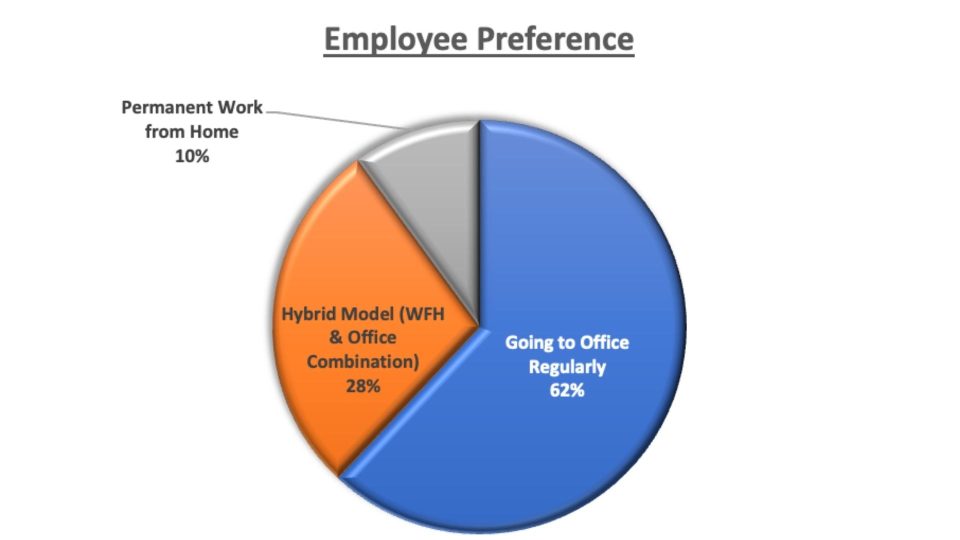
Over 60% Indian employees prefer working from office: Survey

More than 60 per cent of employees in India prefer regular office while only just 10 per cent want permanent work-from-home (WFH), according to a survey conducted in March-April.
The survey, titled “Workplace sentiment post-Covid”, was conducted by The Office Pass (TOP), a neighbourhood coworking and managed office space provider in India.
Also read: Why techies are still taking time to Zoom out of work from home
Employers and employees of 173 small and mid-sized companies participated in the survey. Among the respondents, 73 per cent were male and 27 per cent female. The companies surveyed are in the fields of IT, sales & marketing, finance, customer services and HR, according to TOP.
Releasing the top five findings of the survey, TOP said that 62 per cent of all employees preferred going to the office while 28 per cent liked to work in a hybrid model (combination of work from home and office) and only 10 per cent preferred permanent work from home.

As per the findings of the survey, post-pandemic, many more businesses have realised the economic, social, and health benefits of implementing a hybrid working model compared to the pre-COVID period.
Due to the pandemic, companies had switched to the WFH model. However, in recent times, many organisations have reopened their offices.
Coworking tie-ups
Among those surveyed, employers preferred tying up with a coworking operator. Tie-ups with coworking operators to enable employees to work from near their homes was the preferred option among 48 per cent of employers. This was followed by 19 per cent who wanted to work out of a traditional office. Around 13 per cent of employers chose calling their employees to the office 2-3 days a week on a rotational basis.
In the earlier survey conducted after the first wave of COVID, only 29 per cent of employers had preferred a tie-up with coworking operators.

The main reason for choosing a coworking office was that 38 per cent of respondents would choose a co-working space as it helps in saving commute time to work. The second biggest reason for preferring a co-working space was saving in-office operations costs (highlighted by 27 per cent respondents). Two smaller reasons were networking opportunities (24 per cent) and exhaustion from WFH (12 per cent).
WFH benefits
For the respondents, the top three benefits of WFH were saving on commute-to-office (42 work from home), better health and safety (39 work from home) and more time for children and family (10 work from home).
Companies are planning to hire more employees in the next 12 months compared to the preceding 12 months. The percentage of companies wanting to hire between 25-50 employees has grown from 8 per cent to 25 per cent while hiring more than 50 employees has grown from 6 per cent to 8 per cent. For companies wanting to hire only 10 employees, it has reduced from 60 per cent to 45 per cent.
On the findings of the survey, Nikhil Madan, Cofounder, TOP, said: “Businesses worldwide face multiple challenges, including ensuring that their business is agile enough to adapt to change. Our research shows that businesses that haven’t already considered the financial and strategic benefits of flexible workspace need to do so now. Otherwise, they face being seen as out of touch, both with their competitors and with the demands of the modern workforce on what constitutes a great day at work, which means losing out on the best talent.”

